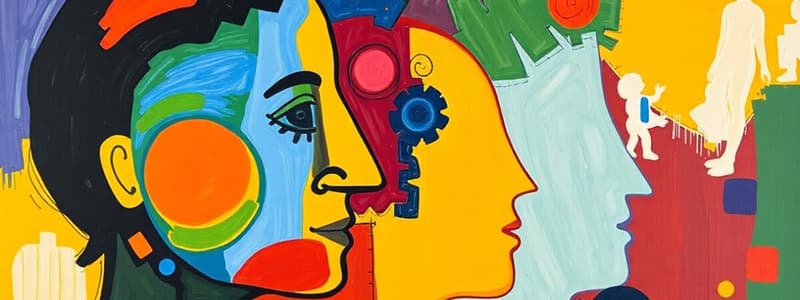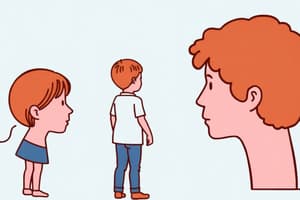Podcast
Questions and Answers
What key aspect does Erik Erikson's theory of psychosocial development emphasize?
What key aspect does Erik Erikson's theory of psychosocial development emphasize?
- Cognitive development during early childhood
- Emotional response patterns in adolescence
- Biological maturation across the lifespan
- Social and cultural influences on personality (correct)
Which term best describes a person's consolidated sense of self according to Erikson?
Which term best describes a person's consolidated sense of self according to Erikson?
- Individual autonomy
- Personal narrative
- Ego identity (correct)
- Self-awareness
What was a primary focus in Erikson's study of personality across the lifespan?
What was a primary focus in Erikson's study of personality across the lifespan?
- The impact of heredity on behavior
- The role of community and societal roles (correct)
- The influence of genetic predispositions
- The stages of cognitive reasoning
In Erikson's view, which of the following elements contributes to the formation of identity?
In Erikson's view, which of the following elements contributes to the formation of identity?
What is a distinguishing feature of Erik Erikson's psychosocial theory compared to Freud's psychosexual theory?
What is a distinguishing feature of Erik Erikson's psychosocial theory compared to Freud's psychosexual theory?
What is a positive resolution of the psychosocial conflict during Toddlerhood?
What is a positive resolution of the psychosocial conflict during Toddlerhood?
Which psychosocial conflict characterizes Middle and Late Childhood?
Which psychosocial conflict characterizes Middle and Late Childhood?
What negative resolution is associated with the psychosocial stage of Early Childhood?
What negative resolution is associated with the psychosocial stage of Early Childhood?
Which factor contributes to the development of intimacy in Young Adulthood?
Which factor contributes to the development of intimacy in Young Adulthood?
What is the primary conflict faced during Adolescence?
What is the primary conflict faced during Adolescence?
How can self-indulgence in older adults negatively affect their cognitive development?
How can self-indulgence in older adults negatively affect their cognitive development?
What emotional experiences might an older adult reflect on due to self-absorption?
What emotional experiences might an older adult reflect on due to self-absorption?
What aspect of moral reasoning does the text imply is critical in cognitive development?
What aspect of moral reasoning does the text imply is critical in cognitive development?
Which of the following is NOT a consequence of self-absorption in older adults?
Which of the following is NOT a consequence of self-absorption in older adults?
What is a likely outcome for older adults who are preoccupied with their own needs?
What is a likely outcome for older adults who are preoccupied with their own needs?
In what way can reflecting on past accomplishments affect an older adult's well-being?
In what way can reflecting on past accomplishments affect an older adult's well-being?
What defines 'right' in Stage 1 of Kohlberg's Preconventional Level?
What defines 'right' in Stage 1 of Kohlberg's Preconventional Level?
Which of the following statements is true about Stage 3 in the Conventional Level?
Which of the following statements is true about Stage 3 in the Conventional Level?
In which stage does Kohlberg’s framework first introduce the concept of fairness and justice?
In which stage does Kohlberg’s framework first introduce the concept of fairness and justice?
What is a characteristic of moral reasoning at the Postconventional Level?
What is a characteristic of moral reasoning at the Postconventional Level?
What does Stage 6 of Kohlberg's moral development propose about moral principles?
What does Stage 6 of Kohlberg's moral development propose about moral principles?
Which of the following stages emphasizes the importance of one's duty to follow laws?
Which of the following stages emphasizes the importance of one's duty to follow laws?
What criterion primarily motivates moral reasoning during the Preconventional Level?
What criterion primarily motivates moral reasoning during the Preconventional Level?
At which stage does moral reasoning begin to acknowledge the rights of all individuals?
At which stage does moral reasoning begin to acknowledge the rights of all individuals?
What characterizes emerging adulthood in industrialized countries?
What characterizes emerging adulthood in industrialized countries?
During which age range does emerging adulthood typically occur?
During which age range does emerging adulthood typically occur?
What is often postponed until later in emerging adulthood?
What is often postponed until later in emerging adulthood?
Which of the following is NOT a characteristic of emerging adulthood?
Which of the following is NOT a characteristic of emerging adulthood?
Which aspect of emerging adulthood reflects the uncertainty associated with this stage?
Which aspect of emerging adulthood reflects the uncertainty associated with this stage?
What is a common social trend observed during emerging adulthood?
What is a common social trend observed during emerging adulthood?
How does the lifestyle of emerging adults typically differ from previous generations?
How does the lifestyle of emerging adults typically differ from previous generations?
Which of the following statements about emerging adulthood is false?
Which of the following statements about emerging adulthood is false?
What is a notable feature of relationships during the emerging adulthood phase?
What is a notable feature of relationships during the emerging adulthood phase?
Why might education completion and career establishment impact marriage timing?
Why might education completion and career establishment impact marriage timing?
What does the psychosocial theory of aging suggest about life satisfaction in late adulthood?
What does the psychosocial theory of aging suggest about life satisfaction in late adulthood?
How does the psychosocial theory of aging view the relationship between activity level and life satisfaction?
How does the psychosocial theory of aging view the relationship between activity level and life satisfaction?
What implication does the psychosocial theory of aging have for elderly individuals?
What implication does the psychosocial theory of aging have for elderly individuals?
Which of the following statements aligns with the psychosocial theory of aging?
Which of the following statements aligns with the psychosocial theory of aging?
In the context of the psychosocial theory of aging, which outcome is least likely to yield life satisfaction?
In the context of the psychosocial theory of aging, which outcome is least likely to yield life satisfaction?
What is the primary effect of menopause on a woman's reproductive capacity?
What is the primary effect of menopause on a woman's reproductive capacity?
At what age is menopause typically considered to begin in women?
At what age is menopause typically considered to begin in women?
Which statement reflects a common misconception about menopause?
Which statement reflects a common misconception about menopause?
What role does menopause play in a woman's life cycle?
What role does menopause play in a woman's life cycle?
What is one of the potential implications of menopause on a woman's overall health?
What is one of the potential implications of menopause on a woman's overall health?
Which of the following is NOT a symptom commonly associated with menopause?
Which of the following is NOT a symptom commonly associated with menopause?
What aspect of reproductive health does menopause signify?
What aspect of reproductive health does menopause signify?
In which geographical context is Ndeye Astou Fall working, and what is significant about her role?
In which geographical context is Ndeye Astou Fall working, and what is significant about her role?
What does menopause primarily indicate about a woman's reproductive system?
What does menopause primarily indicate about a woman's reproductive system?
Which of the following describes the natural progression leading to menopause?
Which of the following describes the natural progression leading to menopause?
Flashcards
Erikson's Theory
Erikson's Theory
A theory focusing on how social and cultural influences impact personality development throughout life.
Psychosocial Development
Psychosocial Development
The process of personality development, influenced by social and cultural factors.
Identity
Identity
A person's sense of self through memories, experiences, values, and beliefs that guide behavior.
Erik Erikson
Erik Erikson
Signup and view all the flashcards
Key Influence
Key Influence
Signup and view all the flashcards
Trust vs. Mistrust (Infancy)
Trust vs. Mistrust (Infancy)
Signup and view all the flashcards
Autonomy vs. Doubt (Toddlerhood)
Autonomy vs. Doubt (Toddlerhood)
Signup and view all the flashcards
Initiative vs. Guilt (Early Childhood)
Initiative vs. Guilt (Early Childhood)
Signup and view all the flashcards
Industry vs. Inferiority (Middle Childhood)
Industry vs. Inferiority (Middle Childhood)
Signup and view all the flashcards
Identity vs. Role Confusion (Adolescence)
Identity vs. Role Confusion (Adolescence)
Signup and view all the flashcards
Moral Reasoning
Moral Reasoning
Signup and view all the flashcards
Cognitive Development
Cognitive Development
Signup and view all the flashcards
Stagnation
Stagnation
Signup and view all the flashcards
Self-Absorption
Self-Absorption
Signup and view all the flashcards
Regret
Regret
Signup and view all the flashcards
Dissatisfaction
Dissatisfaction
Signup and view all the flashcards
Preconventional Morality
Preconventional Morality
Signup and view all the flashcards
Stage 1: Punishment and Obedience
Stage 1: Punishment and Obedience
Signup and view all the flashcards
Stage 2: Mutual Benefit
Stage 2: Mutual Benefit
Signup and view all the flashcards
Conventional Morality
Conventional Morality
Signup and view all the flashcards
Stage 3: Interpersonal Expectations
Stage 3: Interpersonal Expectations
Signup and view all the flashcards
Stage 4: Law and Order
Stage 4: Law and Order
Signup and view all the flashcards
Postconventional Morality
Postconventional Morality
Signup and view all the flashcards
Stage 6: Universal Moral Principles
Stage 6: Universal Moral Principles
Signup and view all the flashcards
Activity Theory of Aging
Activity Theory of Aging
Signup and view all the flashcards
Life Satisfaction
Life Satisfaction
Signup and view all the flashcards
Maintain Activity Level
Maintain Activity Level
Signup and view all the flashcards
Late Adulthood
Late Adulthood
Signup and view all the flashcards
Earlier Years
Earlier Years
Signup and view all the flashcards
Menopause
Menopause
Signup and view all the flashcards
Ndeye Astou Fall
Ndeye Astou Fall
Signup and view all the flashcards
Call Center
Call Center
Signup and view all the flashcards
Senegal
Senegal
Signup and view all the flashcards
French-Speaking World
French-Speaking World
Signup and view all the flashcards
Reproductive Capacity
Reproductive Capacity
Signup and view all the flashcards
Cessation of Menstruation
Cessation of Menstruation
Signup and view all the flashcards
Natural Process
Natural Process
Signup and view all the flashcards
Emerging Adulthood
Emerging Adulthood
Signup and view all the flashcards
Exploration in Emerging Adulthood
Exploration in Emerging Adulthood
Signup and view all the flashcards
Instability in Emerging Adulthood
Instability in Emerging Adulthood
Signup and view all the flashcards
Flexibility in Emerging Adulthood
Flexibility in Emerging Adulthood
Signup and view all the flashcards
Postponed Marriage
Postponed Marriage
Signup and view all the flashcards
Focus on Education
Focus on Education
Signup and view all the flashcards
Career Exploration
Career Exploration
Signup and view all the flashcards
Social Roles
Social Roles
Signup and view all the flashcards
Relationships
Relationships
Signup and view all the flashcards
Industrialized Countries
Industrialized Countries
Signup and view all the flashcards




